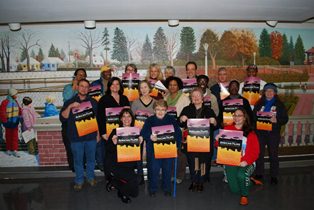 |
The 23rd Annual Cascade Festival of African Films aims to show Portlanders "Africans through African eyes."
"We love the fact that our films don't just expand on what you see on the news," says CFAF coordinator Tara Foster. "There are wonderful things happening in these communities. There are heartbreaking things happening. They are complex societies just like ours and for us to just see one side of what's happening means we're cheating ourselves of an understanding of other countries."
In addition to the feature films, the festival will also feature activities such as a family film day, a student fest and talks with directors and/or other stakeholders. All events are free and open to the public and the films will be available at the PCC Cascade Campus library to anyone with a Multnomah County library card.
The festival is dedicated to the memory of Harold Williams, a member of the PCC Board of Directors and a long-time community leader.
Foster says the festival is both film and education. According to her, the idea is to provide audiences a closer version to the truth.
For example, she says there is a nice connection between the festival's opening night film "Toussaint Louverture" and the recent success of "Django Unchained." While Quentin Tarantino's "Django" is a spaghetti western, revenge narrative about slavery, "Toussaint Louverture" tells the story of the Haitian revolutionary who led the most successful slave revolt in history. Foster says the attention around "Django" can help make the story of Louverture more accessible to those that aren't familiar.
"A lot of people don't understand the significance of the rebel he was," says Foster. "So we
| |
have these two bookends. One fictionalized, Blaxploitation, cowboy film, 'Django,' and then we have this really important, historical film."
A unique feature of the festival is that it will feature talks after every film. Directors Phillipe Niang, Penda Diakite and Eliaichi Kimaro will lead discussions, in addition to other stakeholders, such as professors, economists and others who live in the countries in the films.
"The films are free but our after film speakers are priceless," says Foster. "You don't get to go to a film at a regular theater very often and have someone there that specializes in that field, talking about the content of the film.
"It gives this important perspective that I couldn't give."
These perspectives play a huge part in the selection of the films.
During marathon screening sessions in the summer, Foster says there are times where she might think a film is great but then a stakeholder could make her aware that it exploits a certain segment of society. This helps her and others maintain a sense of nuance and complexity, concerning the films.
In addition, she says organizers do extensive traveling and speak to filmmakers wherever they go.
Audiences tend to reflect the wide variety of countries represented, she says. This can cause some after film discussions to get animated, Foster notes, but there haven't been any serious arguments.
"The Senegalese Association and the Sierra Leone Association and the Somali American Council of Oregon, those people kind of know each other but this is a place once a year where they're all getting together," says Foster. "It's just such a great, safe atmosphere to have discussions about communities and different ways of living within the same community."
The festival will be running from Feb. 1-Mar. 2 at the PCC Cascade Campus in the Moriarty Arts & Humanities Building, Room 104. For more information, go to www.africanfilmfestival.org.




















































































































































































































































































































